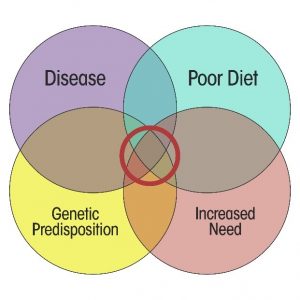Are We Asking The Right Question?
Author: Dr. Stephen Chaney
 We have been told that vitamin D is a miraculous “must have” vitamin. We have been told it’s not just important for healthy bones. It’s also important for a strong immune system, heart health, protection from cancer, and many other health benefits. We have been told that we should get our 25-hydroxy vitamin D levels tested and supplement with extra vitamin D if they are low.
We have been told that vitamin D is a miraculous “must have” vitamin. We have been told it’s not just important for healthy bones. It’s also important for a strong immune system, heart health, protection from cancer, and many other health benefits. We have been told that we should get our 25-hydroxy vitamin D levels tested and supplement with extra vitamin D if they are low.
Now, the latest headlines are saying all of that is wrong. They are telling us vitamin D supplements do not improve bone density or protect against falls and bone fractures. They are telling us to forget all the other claimed benefits of vitamin D. Those claims have been disproved. Forget about the 25-hydroxy vitamin D tests. They are a waste of money.
What is the truth? Why is it so confusing? Are vitamin D supplements worthless? Let me guide you through the claims and counterclaims so you can discover the truth for yourself.
How Did Vitamin D Become So Popular?
 Let’s start with a brief history of vitamin D. It all started with the industrial revolution in Northern Europe. Suddenly, children and adults in the large cities were spending the bulk of their waking hours in dark factories rather than outdoors on the farm. They were already living in northern latitudes where sunlight was weak during the winter months. To make matters worse pollution from the factories was creating a haze that blocked the sunlight.
Let’s start with a brief history of vitamin D. It all started with the industrial revolution in Northern Europe. Suddenly, children and adults in the large cities were spending the bulk of their waking hours in dark factories rather than outdoors on the farm. They were already living in northern latitudes where sunlight was weak during the winter months. To make matters worse pollution from the factories was creating a haze that blocked the sunlight.
That lead directly to the discovery that sunlight was crucial to our body’s ability to synthesize vitamin D and that vitamin D was essential for building strong bones. The solution to the public health crisis of rickets and osteomalacia was to fortify dairy products with vitamin D. The almost universal adaptation of vitamin D fortification virtually eliminated rickets and osteomalacia except in association with certain rare diseases. The two important lessons learned from this experience were:
- Vitamin D is essential for healthy bone formation.
- Vitamin D supplementation improves bone health for individuals who are deficient in vitamin D
As we discuss the latest findings, we need to keep in mind that these fundamental principles have not changed.
In the late 20th century our understanding of vitamin D took another leap with the discovery that vitamin D receptors were not restricted to bone cells. Almost every cell in our body contained vitamin D receptors. That lead to studies showing that people with low vitamin D intakes were more likely to experience heart disease, cancer, some autoimmune diseases, and infectious diseases such as flu than people with high vitamin D intakes.
The final leap in our understanding of vitamin D took place when the medical profession started routinely testing blood levels of 25-hydroxy vitamin D. That is when we discovered that some people who appeared to have adequate intake of vitamin D and/or adequate exposure to sunlight had low blood levels of 25-hydroxy vitamin D. Furthermore, follow-up studies showed that low 25-hydroxyvitamin D levels correlated with an increased risk of heart disease, cancer, and infectious disease. The important lessons learned from these experiments were:
- Vitamin D deficiency is associated with increased risk of multiple diseases.
- 25-hydroxy vitamin D tests are the best way to measure vitamin D deficiency.
Once again, these fundamental principles have not changed.
What Did The Study Show?
 The study (MJ Bolland et al, Lancet Diabetes Endocrinology 2018) behind the headlines was a meta-analysis of 81 randomized, placebo-controlled studies with a total of 53,537 subjects that looked at the effect of vitamin D supplementation in elderly populations on bone mineral density, bone fractures, and falls.
The study (MJ Bolland et al, Lancet Diabetes Endocrinology 2018) behind the headlines was a meta-analysis of 81 randomized, placebo-controlled studies with a total of 53,537 subjects that looked at the effect of vitamin D supplementation in elderly populations on bone mineral density, bone fractures, and falls.
The meta-analysis only included studies in which vitamin D intake was the sole variable. In many cases the subjects were not taking a calcium supplement. If they were taking a calcium supplement, both the vitamin D group and placebo group were taking the same amount of calcium.
The results were unequivocal. In this study vitamin D supplementation had no effect on bone mineral density, bone fractures, or falls in elderly populations. The authors concluded “There is little justification to use vitamin D supplements to maintain or improve musculoskeletal health.”
Is this conclusion justified? Let’s put the findings of this study into a broader perspective.
Are We Asking The Right Questions?
 Before throwing out our vitamin D supplements let’s ask whether this study is asking the right question. I have covered this topic in detail in my new book “Slaying The Supplement Myths” (https://slayingthesupplementmyths.com) with respect to similar studies that had called into question the value of calcium supplements for bone health. Let me cover the highlights here.
Before throwing out our vitamin D supplements let’s ask whether this study is asking the right question. I have covered this topic in detail in my new book “Slaying The Supplement Myths” (https://slayingthesupplementmyths.com) with respect to similar studies that had called into question the value of calcium supplements for bone health. Let me cover the highlights here.
In my book I created the graphic on the right to put the question of who benefits from supplementation into perspective. For the purposes of this discussion, I will just focus on poor diet (or, in the case of vitamin D, poor exposure to sunlight). As I discussed above, science shows that people who are not getting enough vitamin D from diet and sunlight benefit from vitamin D supplementation. Unfortunately, vitamin D enthusiasts and some supplement companies have muddied the waters by going beyond what good science shows and suggesting or implying that everyone will benefit from vitamin D supplementation.
This is part of the problem. Once you have created a paradigm that everyone will benefit from vitamin D supplementation, that paradigm is easy to disprove. If someone already has adequate, or nearly adequate, levels of 25-hydroxy vitamin D, would we expect additional vitamin D to make a difference? Of course not, but that is exactly the question the most recent study was asking.
In discussing the limitations of their study, the authors said: “It is possible that trials of populations with low baseline 25-hydroxy vitamin D might produce different results because only 4 trials, involving 831 participants (1.6% of all participants), reported mean baseline 25-hydroxy vitamin D levels lower than 25 nmol/L (the level indicating vitamin D deficiency).
In other words, the study did not measure the effect of vitamin D supplementation for people who were vitamin D deficient. The only take-home lesson from this study is that people with adequate, or near adequate, vitamin D status do not benefit from vitamin D supplementation. That is a “no-brainer.”
Vitamin D And A Bone Healthy Lifestyle
 The other glaring deficiency of this study is that it was only measuring the effect of vitamin D on bone health. They purposely excluded any other factor that might influence bone health. That was a fatal flaw because healthy bone requires a holistic approach, not individual nutrients. In my book Slaying the Supplement Myths I refer to this as a “bone healthy lifestyle.”
The other glaring deficiency of this study is that it was only measuring the effect of vitamin D on bone health. They purposely excluded any other factor that might influence bone health. That was a fatal flaw because healthy bone requires a holistic approach, not individual nutrients. In my book Slaying the Supplement Myths I refer to this as a “bone healthy lifestyle.”
The most important feature of a “bone healthy lifestyle” is this:
- Calcium, vitamin D, and resistance (weight bearing) exercise are all essential for healthy bones.
- However, none of them is sufficient by itself. You need all three. You need a holistic approach if you wish to build strong bones.
Simply put, that means unless you include adequate calcium and exercise there is no reason to expect vitamin D supplementation to help build strong bones. Unfortunately, none of the studies included in the recent meta-analysis took a holistic approach to bone health. Some included calcium, but many didn’t. Resistance exercise was never considered. The studies were doomed to failure.
When you include flawed studies in your meta-analysis, you have what computer programmers call “Garbage in. Garbage out.” A meta-analysis can never be stronger than the individual studies it includes.
Other features of a “bone healthy lifestyle” include:
- We need more than calcium and vitamin D for strong bones. We need magnesium, zinc, copper, manganese, vitamin C and vitamin K. If we are deficient in any of these, calcium will not be utilized as efficiently.
- The foods we eat are also important. Our bones serve as a buffer system to keep our bodies slightly alkaline. Every time we eat acid-forming foods a little bit of bone is dissolved to neutralize the acid. For optimal bone health we need to minimize acid-forming foods and eat more alkaline-forming foods. That means we need to avoid sodas, sweets and refined grains. We also need to minimize meats, eggs, and dairy. Instead, we should focus on fruits, vegetables, peas, beans, lentils, seeds, and nuts.
- Beware of drugs. The list of common medications that dissolve bones is a long one. Some of the worst offenders are anti-inflammatory steroids such as cortisone and prednisone, drugs to treat depression, drugs to treat acid reflux, and excess thyroid hormone. I am not suggesting that you should avoid properly prescribed medications. I would suggest you ask your doctor or pharmacist whether the drugs you are taking adversely affect bone density. If they do, you should pay a lot more attention to the other aspects of a “bone healthy lifestyle.”
Are Vitamin D Supplements Worthless?
 Now we can come back to the question “Are vitamin D supplements worthless?” as the recent headlines have suggested. If you phrase the question as “Does everyone benefit from vitamin D supplementation?” or “Is vitamin D supplementation alone sufficient to build strong bones?” the answer is a clear no.
Now we can come back to the question “Are vitamin D supplements worthless?” as the recent headlines have suggested. If you phrase the question as “Does everyone benefit from vitamin D supplementation?” or “Is vitamin D supplementation alone sufficient to build strong bones?” the answer is a clear no.
However, those are the wrong questions. If you ask: “Does vitamin D supplementation benefit people who are vitamin D-deficient?” the answer is a clear yes. If you ask: “Does a holistic approach that includes resistance exercise, adequate calcium, and adequate vitamin D improve bone health?” the answer is likely to be yes as well.
What about the headlines claiming that vitamin D is also worthless for strengthening the immune system and reducing the risk of heart disease, cancer, and auto-immune diseases? The studies on which these claims are based suffer from the same flaws. They are asking the same wrong questions.
My recommendations:
- Have your blood levels of 25-hydroxy vitamin D tested on a regular basis. I have them tested each year when I get my physical.
- If your blood levels of 25-hydroxy vitamin D are below 25 nmol/L (which the NIH considers deficient), you are likely to benefit from vitamin D supplementation. If they are above 50 nmol/L (which the NIH considers sufficient), vitamin D supplementation is unlikely to provide additional benefit. However, that level of vitamin D doesn’t guarantee that you will have strong bones. You also need sufficient calcium and resistance exercise.
- If your blood levels are in the insufficient range (between 25 nmol/L and 50 nmol/L), the situation is more complicated. If you are close to 50 nmol/L, you may benefit slightly from adding a vitamin D supplement, but the benefit will be too small to show up in a clinical study such as the one that resulted in the recent headlines. My advice is to look at your diet and medication use. If they put you at risk for low bone density, my recommendation would be to add a vitamin D supplement – along with adequate calcium and resistance exercise, of course. If you are closer to 25 nmol/L, you will likely benefit from a vitamin D supplement along with adequate calcium and exercise.
- Don’t think of vitamin D supplementation as a “magic bullet” that will solve all your ills. Instead, think of it as just one component of a holistic approach to a bone healthy lifestyle.
The Bottom Line
A recent meta-analysis concluded that vitamin D supplementation did not improve bone mineral density, reduce bone fractures, or reduce falls in the elderly. While this conclusion was definitive, the study was asking the wrong questions.
- We know that vitamin D improves bone health for people who are vitamin D-deficient. However, only 1.6% of the people in this study were vitamin D-deficient at the beginning of the study. That means the study was really asking: “If people have adequate, or near adequate, vitamin D status, does vitamin D supplementation provide any additional benefit?” The answer to that question is a “no-brainer.” There is no reason to expect that additional vitamin D would provide benefit.
- We know that while vitamin D is essential for building strong bones, it is not sufficient by itself. Strong bones require a holistic approach that includes resistance exercise, adequate calcium, and adequate vitamin D. However, this study only looked at the effect of vitamin D on bone health. Calcium and exercise were excluded from consideration. That means the study was really asking: “Is vitamin D a “magic bullet” that can build strong bones by itself?” Again, there is no reason to expect vitamin D to provide much benefit under those conditions.
My recommendations:
- Have your blood levels of 25-hydroxy vitamin D tested on a regular basis. I have them tested each year when I get my physical.
- If your blood levels of 25-hydroxy vitamin D are low, you are likely to benefit from vitamin D supplementation. If they are already optimal, vitamin D supplementation is unlikely to provide additional benefit.
- Don’t think of vitamin D supplementation as a “magic bullet” that will keep your bones strong by itself. Instead, think of it as just one component of a holistic “bone healthy lifestyle.”
For more details and to see my detailed recommendations, read the article above.
These statements have not been evaluated by the Food and Drug Administration. This information is not intended to diagnose, treat, cure or prevent any disease.
